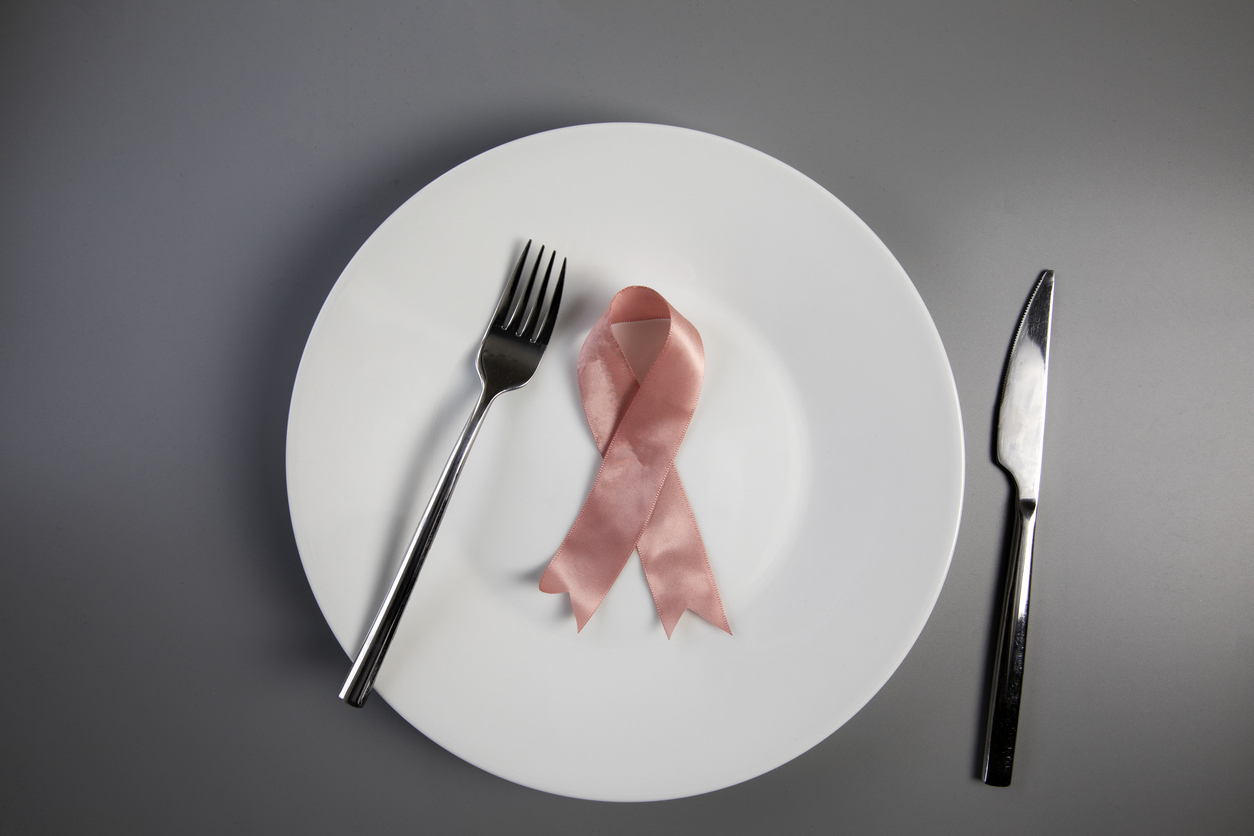2025-10-04
Breast cancer: could the key lie in our diet and our bacteria?
Oncology
By Lila Rouland | Published October 4th, 2025 | 2 min read
#Oncology #BreastCancer #Microbiome #Nutrition #Chemotherapy
Breast cancer (BC) remains the most common cancer among women worldwide and one of the leading causes of mortality. Its rising incidence is linked not only to genetic and hormonal factors, but also to modifiable lifestyle elements such as diet, obesity, and sedentary behavior. This review explores how nutrition and gut microbiome modulation may contribute to prevention, treatment, and survival after BC, highlighting the growing importance of the nutrition–microbiome axis.
The gut microbiome, composed of trillions of microorganisms, influences digestion, immunity, hormone metabolism, and systemic inflammation. Dysbiosis—an imbalance in microbial communities—is implicated in obesity, diabetes, and various cancers, including BC. For example, gut bacteria regulate estrogen metabolism via β-glucuronidase, which reactivates these hormones and may promote hormone-dependent cancers. Additionally, some microbes produce short-chain fatty acids (SCFAs) with anti-inflammatory and anti-tumor effects.
In BC patients, reduced microbial diversity and distinct composition have been observed. Pathogenic species such as Fusobacterium nucleatum and Bacteroides fragilis promote tumor growth and metastasis, while beneficial bacteria (e.g., Lactobacillus, Bifidobacterium) exert protective effects by strengthening the epithelial barrier, regulating immunity, and inducing tumor cell apoptosis. Recent research also suggests the existence of a specific breast tissue microbiome, which could directly influence the tumor microenvironment.
Eating habits strongly influence both BC risk and microbiome composition.
Several dietary compounds show anticancer effects:
Soy isoflavones (genistein, daidzein): phytoestrogens that preferentially bind ERβ receptors, limiting cell proliferation. Early-life consumption (childhood/adolescence) is most protective. Soy may enhance tamoxifen efficacy and support probiotic growth.
Sulforaphane (broccoli, cabbage): a powerful antioxidant and epigenetic regulator, promoting apoptosis, reducing tumor size, and improving chemotherapy effectiveness. It also boosts intestinal Lactobacillus.
Green tea polyphenols (EGCG): antioxidant, anti-angiogenic, and pro-apoptotic effects. Associated with lower recurrence risk and synergy with tamoxifen.
Curcumin (turmeric): inhibits NF-κB, STAT3, and HER2, reducing proliferation and metastasis. Also promotes beneficial bacteria (Bifidobacterium, Lactobacillus).
Resveratrol (grapes, red wine): anti-inflammatory and antioxidant, modulates apoptosis, and interferes with estrogen-dependent cancers. The microbiome transforms resveratrol into bioactive anticancer metabolites.
Nutrition and microbiome modulation appear to be complementary, non-toxic levers in the fight against breast cancer. Combined with standard therapies, these approaches could enhance treatment efficacy, reduce recurrences, and improve quality of life. The challenge now is to confirm these promises through large-scale clinical trials, paving the way for more personalized and integrative care.
About the author – Lila Rouland
With dual expertise in science and marketing, Lila brings her knowledge to the service of healthcare innovation. After five years in international academic research, she transitioned into medical and scientific communication within the pharmaceutical industry. Now working as a medical writer and content developer, she is committed to highlighting scientific knowledge and conveying it to healthcare professionals with clarity and relevance.
#Oncology #BreastCancer #Microbiome #Nutrition #Chemotherapy
Breast cancer (BC) remains the most common cancer among women worldwide and one of the leading causes of mortality. Its rising incidence is linked not only to genetic and hormonal factors, but also to modifiable lifestyle elements such as diet, obesity, and sedentary behavior. This review explores how nutrition and gut microbiome modulation may contribute to prevention, treatment, and survival after BC, highlighting the growing importance of the nutrition–microbiome axis.
Microbiome: the new key player in breast cancer
The gut microbiome, composed of trillions of microorganisms, influences digestion, immunity, hormone metabolism, and systemic inflammation. Dysbiosis—an imbalance in microbial communities—is implicated in obesity, diabetes, and various cancers, including BC. For example, gut bacteria regulate estrogen metabolism via β-glucuronidase, which reactivates these hormones and may promote hormone-dependent cancers. Additionally, some microbes produce short-chain fatty acids (SCFAs) with anti-inflammatory and anti-tumor effects.
In BC patients, reduced microbial diversity and distinct composition have been observed. Pathogenic species such as Fusobacterium nucleatum and Bacteroides fragilis promote tumor growth and metastasis, while beneficial bacteria (e.g., Lactobacillus, Bifidobacterium) exert protective effects by strengthening the epithelial barrier, regulating immunity, and inducing tumor cell apoptosis. Recent research also suggests the existence of a specific breast tissue microbiome, which could directly influence the tumor microenvironment.
Dietary strategies: feeding health, starving the tumor
Eating habits strongly influence both BC risk and microbiome composition.
- Mediterranean Diet (MD): based on fruits, vegetables, legumes, fish, and olive oil. It reduces mortality risk by 13% and improves 15-year survival (63.1% vs. 53.6%). MD also promotes greater microbial diversity and beneficial bacteria such as Bifidobacterium and Faecalibacterium prausnitzii.
- Ketogenic Diet (KD): low-carb, high-fat. It limits glucose, on which tumor cells depend (Warburg effect). Animal and clinical studies show reduced tumor size and improved chemotherapy response. In humans, it has been linked to lower serum insulin and tumor volume, with a notable reduction in disease stage in some cases. However, it decreases microbial diversity and SCFA production.
- Plant-based diets: high in fiber and phytochemicals (polyphenols, phytoestrogens). Associated with a 15–20% reduction in cancer mortality, they regulate key tumor pathways such as NF-κB and estrogen signaling. They also increase beneficial bacteria and SCFA production.
- DASH diet: originally designed for hypertension, it also lowers BC risk, especially in premenopausal women. Rich in fiber and antioxidants, it reduces estrogen reabsorption and supports a protective microbiome.
Hidden molecules in our plates that fight cancer
Several dietary compounds show anticancer effects:
Soy isoflavones (genistein, daidzein): phytoestrogens that preferentially bind ERβ receptors, limiting cell proliferation. Early-life consumption (childhood/adolescence) is most protective. Soy may enhance tamoxifen efficacy and support probiotic growth.
Sulforaphane (broccoli, cabbage): a powerful antioxidant and epigenetic regulator, promoting apoptosis, reducing tumor size, and improving chemotherapy effectiveness. It also boosts intestinal Lactobacillus.
Green tea polyphenols (EGCG): antioxidant, anti-angiogenic, and pro-apoptotic effects. Associated with lower recurrence risk and synergy with tamoxifen.
Curcumin (turmeric): inhibits NF-κB, STAT3, and HER2, reducing proliferation and metastasis. Also promotes beneficial bacteria (Bifidobacterium, Lactobacillus).
Resveratrol (grapes, red wine): anti-inflammatory and antioxidant, modulates apoptosis, and interferes with estrogen-dependent cancers. The microbiome transforms resveratrol into bioactive anticancer metabolites.
Conclusion & Perspectives
Nutrition and microbiome modulation appear to be complementary, non-toxic levers in the fight against breast cancer. Combined with standard therapies, these approaches could enhance treatment efficacy, reduce recurrences, and improve quality of life. The challenge now is to confirm these promises through large-scale clinical trials, paving the way for more personalized and integrative care.
Read next: Transforming lifestyle habits during chemotherapy: Insights from the LEANer trial
About the author – Lila Rouland
Doctor of Oncology, specialized in Biotechnology and Management

Last press reviews
Parental alcohol intoxication: the hidden impact on children’s mental health

By Carolina Lima | Published on January 19, 2026 | 3 min read
Obesity: when the kidneys become overwhelmed

By Ana Espino | Published on January 16, 2026 | 3 min read...
